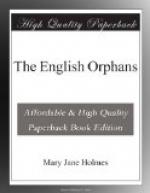“Half of all I own is theirs by right,” said she, “and what I want is, that on their 21st birth-day they shall come into possession of the portion which ought to have been their mother’s, while at my death the remainder shall be equally divided between them.”
The will was accordingly drawn up, signed and sealed, Mr. Worthington keeping a rough draft of it, which was thrown among some loose papers in his office. A few afterwards Henry coming accidentally upon it, read it without any hesitation.
“That settles it at once,” said he, “and I can’t say I’m sorry, for I was getting horribly sick of her. Now I’d willingly marry Mary without a penny, but Ella, with only one quarter as much as I expected, and that not until she’s twenty-one, is a different matter entirely. But what am I to do? I wish Moreland was here, for though he don’t like me (and I wonder who does), he wouldn’t mind lending me a few thousand. Well, there’s no help for it; and the sooner the old man breaks now, the better. It’ll help me out of a deuced mean scrape, for of course I shall be magnanimous, and release Ella at once from her engagement with a ruined man.”
The news that Mary was Mrs. Campbell’s niece spread rapidly, and among those who came to congratulate her, none was more sincere than William Bender. Mary was very dear to him, and whatever conduced to her happiness added also to his. Together with her he had heard the rumor of Mr. Lincoln’s downfall, and while he felt sorry for the family, he could not help hoping that it would bring Jenny nearer to him. Of this he told Mary, who hardly dared trust herself to reply, lest she should divulge a darling secret, which she had cherished ever since Mrs. Campbell had told her that, in little more than a year, she was to be the rightful owner of a sum of money much larger than she had ever dreamed it possible for her to possess. Wholly unselfish, her thoughts instantly turned towards her adopted brother. A part of that sum should be his, and with that for a stepping stone to future wealth, Mrs. Lincoln, when poor and destitute, could no longer refuse him her daughter Mrs Campbell, to whom alone she confided her wishes, gave her consent, though she could not understand the self-denying love which prompted this act of generosity to a stranger.
And now Mary was very happy in thinking how much good she could do. Mrs. Mason, her benefactress, should never want again. Sally Furbush, the kind-hearted old crazy woman who had stood by her so long and so faithfully, should share her home wherever that home might be; while better than all the rest, William Bender, the truest, best friend she ever had, should be repaid for his kindness to her when a little, unknown pauper. And still the world, knowing nothing of the hidden causes which made Mary’s laugh so merry and her manner so gay, said that “the prospect of being an heiress had turned her head, just as it always did those who were suddenly elevated to wealth.”




